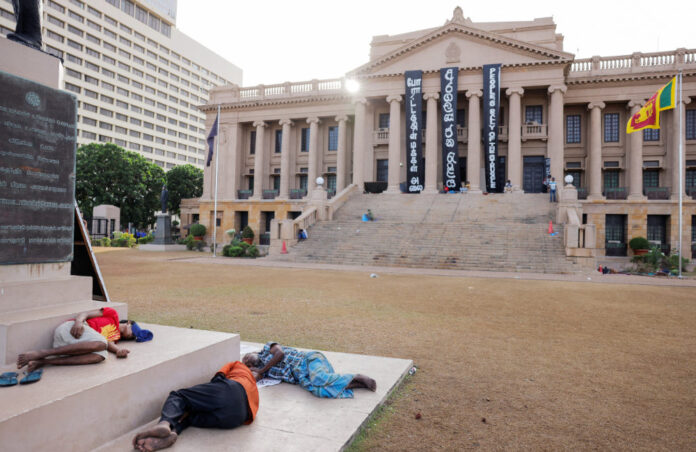COLOMBO: Sri Lanka’s parliament accepted on Friday the resignation of President Gotabaya Rajapaksa, officially ending the rule of the country’s most powerful political dynasty that held power for nearly two decades.
Rajapaksa fled to the Maldives on Wednesday to escape a popular uprising over the role his family played in the country’s worst economic meltdown since independence from Britain in 1948.
For months the island nation of 22 million people has been struggling with daily power cuts and shortages of basic commodities such as fuel, food and medicines, as foreign currency reserves have run out, making Sri Lanka unable to pay for imports.
Protests flared up in Colombo in March and have grown since, spreading across the country.
They culminated last week, when thousands of demonstrators stormed parliament and government buildings. The protesters continued to occupy the buildings until Thursday afternoon.
Rajapaksa submitted his resignation as he left the Maldives for Singapore.
The formal announcement of him quitting was made in a televised address by Parliament Speaker Mahinda Yapa Abeywardena on Friday morning.
Prime Minister Ranil Wickremesinghe, who was sworn in as interim president, said that lawmakers would choose the country’s new leader and amend the constitution to reduce presidential powers.
“Measures are being taken for the new president who will be elected next week to present the 19th amendment to parliament,” Wickremesinghe said.
The amendment, which made parliament stronger in 2015, was scrapped when Rajapaksa became president in 2019.
The fall of Rajapaksa as president marks the formal ousting of his family from government.
The political dynasty began with the former president’s elder brother, Mahinda Rajapaksa, who was president in 2005-15. During his presidential term, he was credited in 2009 with ending the country’s 30-year-long civil war with the rebels known as the Tamil Tigers.
Mahinda’s three brothers were involved in politics at that time too: Gotabaya led the Defense Ministry, Chamal — the eldest of Rajapaksa siblings — was speaker of the parliament, and the youngest, Basil, was a Cabinet minister.
After Mahinda’s presidential term ended, he was out of the top leadership for three years until he became prime minister in 2018.
When Gotabaya won the presidency in 2019, the family’s grip on power strengthened: Chamal Rajapaksa was soon named the minister of irrigation and the state minister of home affairs and of national security and disaster management, while Basil was appointed finance minister. Mahinda’s son, Namal Rajapaksa, became minister of youth and sports.
While all of them have resigned in the past few months as protests — dubbed “aragalaya” (struggle) — swept the country, opinion is divided about whether the Rajapaksa era has come to an end with the president’s ousting.
“The ‘aragalaya’ of the hungry angry youths of Sri Lanka has successfully eliminated the Rajapaksa family rule in a manner that none of them will dare to return to any political role in the country for decades to come,” Supreme Court lawyer and former diplomat M. M. Zuhair told Arab News.
He said that those who led the popular uprising would now have to prevent the re-emergence of junior Rajapaksas in power.
But the family’s grip may be restored through its ally, the current interim president, according to Dr. Dayan Jayatillake, Sri Lanka’s former envoy to the UN in Geneva.
The Sri Lanka Podujana Peramuna party, which has a majority in parliament and is led by Mahinda Rajapaksa, has already announced its support for Wickremesinghe becoming the country’s leader in the parliamentary election.
“If Ranil comes back as president, definitely, Rajapaksa’s influence will be in full force,” Jayatillake said.
The Wickremesinghe scenario is what protesters say they will try to prevent as well.
Senaka Perera, a prominent lawyer representing the protesters, said that they wanted Wickremesinghe out too.
“The goal is not achieved yet,” he told Arab News.
Wickremesinghe “is a stooge of Rajapaksa, his presence in the government is as good as one of the Rajapaksas.”
Parliament is expected to convene on Saturday to begin the process of electing the country’s new leader, who will serve until the end of Rajapaksa’s term in 2024.

